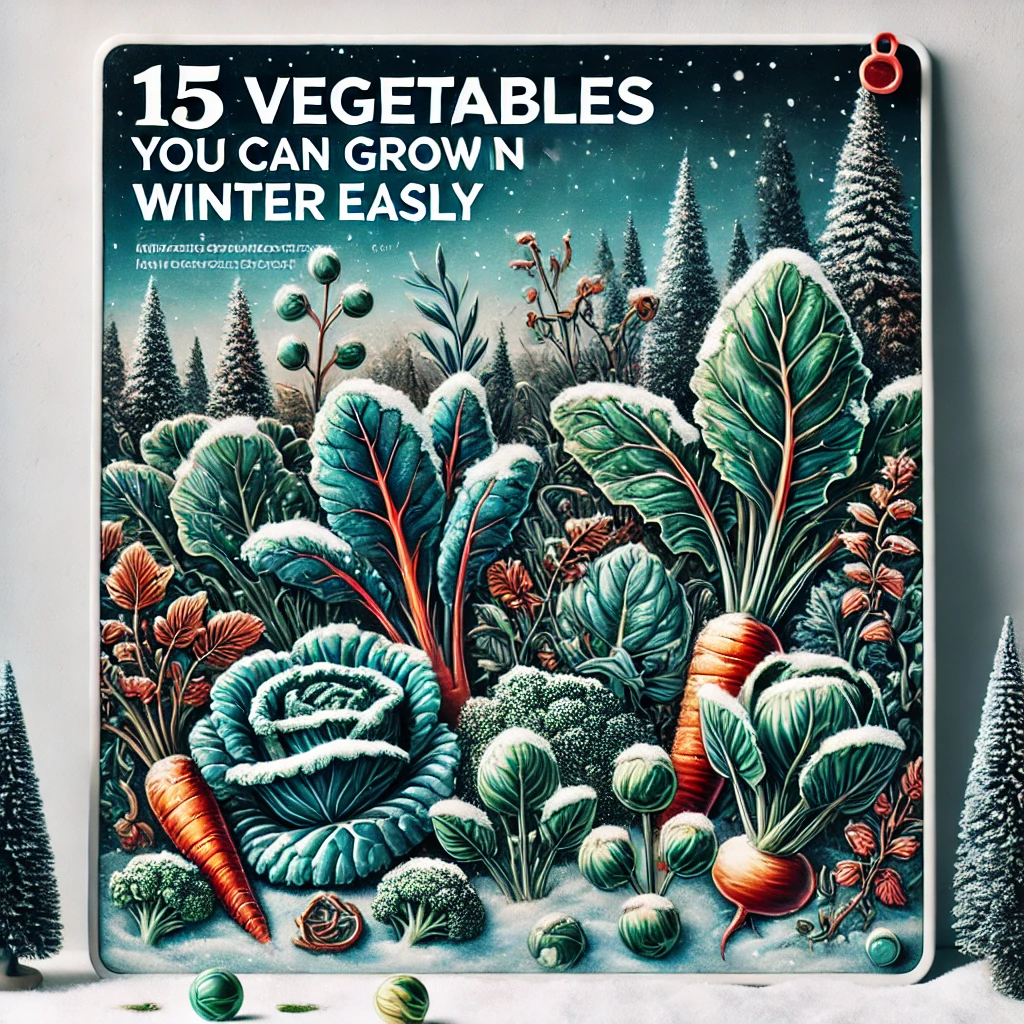15 Vegetables You Can Grow in Winter Easily: A Personal Guide to Winter Gardening
Winter gardening might seem like an impossible task, but trust me, it’s not only doable—it can also be incredibly rewarding. As someone who loves to experiment with home gardening, I’ve learned that winter vegetables are not just a practical choice, but also an opportunity to grow healthy, fresh produce even in the coldest months. In this article, I’ll share 15 vegetables you can grow in winter with ease. Grab your gardening gloves, because winter gardening is about to get a lot more exciting!
1. Spinach: The Winter Superstar

Spinach is one of the easiest and most productive vegetables to grow in winter. It thrives in cooler temperatures and can even tolerate frost. I’ve grown spinach in my own garden during winter, and it’s always been a success. To grow it, all you need is well-draining soil and plenty of sunlight. It’s best planted in early fall, but if the temperature is mild, you can start spinach seeds right in the winter. Spinach doesn’t need much maintenance and will give you delicious leaves for salads or cooking.
2. Kale: A Cold-Hardy Green

Kale is another vegetable that thrives in the winter. It’s incredibly resilient, even in freezing temperatures. If you’ve ever tried kale chips or added it to soups, you know how tasty this leafy green can be. I’ve had kale growing in my garden through several frosty winters, and it’s still as vibrant as ever. It grows best when the temperature is between 40-60°F (4-16°C), and with a little protection from the harshest winds, you’ll be harvesting fresh kale all winter long.
3. Carrots: Root Veggies for Winter

Carrots are surprisingly easy to grow in winter. I love the idea of having fresh, crunchy carrots right out of the garden even when the temperature drops. These root vegetables actually get sweeter after exposure to frost, so winter is the perfect time to grow them. Simply plant your carrot seeds in late fall, and by winter, you’ll have tender, flavorful roots ready to harvest.
4. Brussels Sprouts: A Winter Delight

If you’re a fan of Brussels sprouts, you’re in for a treat. These mini cabbages love the cold and can even improve in flavor after a frost. I’ve always enjoyed growing Brussels sprouts because they’re a fun challenge and are so rewarding to harvest. They take a little longer to grow, but the wait is worth it. Plant them in late summer or early fall, and you’ll be snacking on these green gems all winter long.
5. Swiss Chard: Colorful and Resilient

Swiss chard is a versatile and visually stunning vegetable that thrives in colder months. I’ve grown it in my garden for years and find it to be both beautiful and nutritious. Swiss chard can survive light frosts and still produce vibrant, colorful leaves throughout the winter. It’s a hardy green that loves the winter chill, making it an excellent choice for colder climates.
6. Garlic: A Flavorful Winter Herb

Garlic isn’t just a kitchen staple; it’s also easy to grow during the winter months. I planted garlic cloves in late fall, and by the next spring, I had bulbs of garlic ready for use. Garlic needs a chilling period to grow properly, which makes it perfect for winter planting. It’s a great addition to your winter vegetable garden and will provide flavor for your cooking for months to come.
7. Leeks: Winter’s Sweet Onion

Leeks are cold-hardy and perfect for growing in winter. They have a mild, sweet onion flavor that makes them a great addition to soups, stews, and even salads. I started planting leeks in my garden a few years ago, and I’ve been hooked ever since. They take a little time to grow, but once they mature, they’re incredibly rewarding. Be sure to mulch them well to keep the roots insulated during frosty nights.
8. Cabbage: The Winter King

Cabbage is another winter vegetable that does incredibly well in colder temperatures. In fact, cabbage actually tastes better after being exposed to a light frost. I’ve grown cabbage in my garden during winter months, and it’s always been a success. It’s perfect for making sauerkraut, adding to stews, or simply sautéing with a bit of butter. With the right care, cabbage will flourish even in cold weather.
9. Mustard Greens: Quick and Easy to Grow

If you’re looking for a quick-growing winter green, mustard greens are a great choice. These leafy greens thrive in cooler weather and grow quickly, meaning you’ll have a fresh crop ready for harvesting in no time. I’ve found mustard greens to be a reliable winter vegetable that doesn’t require much effort. They add a spicy kick to any dish and are perfect for salads or sautéing.
10. Radishes: Fast-Growing Winter Vegetables

Radishes are one of the fastest-growing vegetables you can plant in winter. They don’t take much space, and they’re ready for harvest in as little as three weeks. I’ve grown radishes during winter and found them to be extremely easy to care for. Radishes love the cold, and they develop a crisp, spicy flavor when grown in winter. Plant them in well-drained soil, and they’ll do just fine in your garden.
11. Turnips: A Frost-Tolerant Root Veggie

Turnips are another root vegetable that thrives in winter. They’re perfect for roasting, mashing, or adding to soups and stews. I’ve always enjoyed growing turnips because they’re so versatile in the kitchen. These hardy vegetables do well in cold temperatures and are an excellent source of fiber and vitamins. Plant them in late summer or early fall, and they’ll be ready for harvest in winter.
12. Broccoli: The Winter-Friendly Brassica

Broccoli is a cold-loving vegetable that can survive through the winter months with proper care. I’ve planted broccoli in late summer, and by late fall or early winter, I’ve been able to harvest its nutritious florets. Broccoli thrives in temperatures around 40-60°F (4-16°C), so it’s an excellent addition to any winter vegetable garden. Plus, it’s packed with vitamins and minerals, making it a healthy option for winter meals.
13. Chives: Easy to Grow, Even in Winter

Chives are a hardy herb that can withstand colder temperatures. I always make sure to have a few chive plants in my winter garden, as they’re great for adding a fresh, onion-like flavor to dishes. They grow quickly, don’t require much care, and can even survive light snow. Chives are perfect for winter gardening, especially if you’re short on space or want something low-maintenance.
14. Parsley: A Cool-Weather Herb

Parsley is a cool-weather herb that can easily be grown in winter. I’ve found it to be very hardy and capable of thriving even in frosty conditions. It adds a bright, fresh flavor to soups, stews, and salads. If you’re growing parsley during the winter, make sure to keep it in a sheltered spot and mulch around the roots to protect it from extreme cold.
15. Endive: A Winter Salad Green

Endive is a versatile, cold-tolerant vegetable that can add some variety to your winter salads. It grows best in cooler temperatures, and I’ve found it to be quite easy to grow in winter. Endive adds a slightly bitter flavor, making it a great addition to mixed greens. It’s perfect for those who want to enjoy fresh, homemade salads during the winter months.





